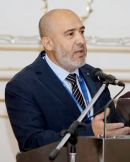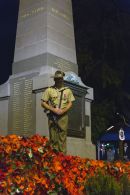| Cover |
| EDITORIAL: Now is the time for MPs to serve Lebanon |
 |
EDITORIAL: Now is the time for MPs to serve Lebanon The numbers of body blows that the Lebanese people have received since the end of 2019 cannot be easily counted -- or endured. The economic and living crisis has been accompanied by a systematic plan to unfairly distribute financial losses that have been borne by small depositors. To re-inject hard currency into the Lebanese economy, whose currency (the pound) has deteriorated in value, the system forced thousands to emigrate. The country, long known for exploiting foreign remittances, will benefit this time from the money of the expatriates but at the expense of the energy of productive youths. Most of the people are aware of Lebanon’s disasters and what has befallen, internally and externally, dating back years. But internal corruption, and a corrupt system, has taken root for decades; its impact was influential and destructive. During this tragic situation, the Lebanese government (headed by Najib Mikati) was formed after 13 months of a leadership vacuum that Lebanon did witness as most of the Lebanese people suffered all kinds of tragedies -- destruction, hunger, unemployment, inflation, money smuggling and the emigration of Lebanese youth. Today, the Lebanese are living in destitution and oppression, with a very low standard of living; so low, in fact, displaced Syrian refugees within Lebanon are now living much better than the average Lebanese citizen. Proceeding from this painful reality, during the COVID-19 pandemic, the cold of winter is now at the door. Now, the need for fuel, for power, is even greater. Therefore, the new government in Lebanon faces many challenges and responsibilities as the eyes of most of the people focus on the performance of the government and parliament. Lebanese citizens will no longer be satisfied with the procrastination and postponement of major cases and projects, of which there are many, the most important of which are criminal audit, the financing card, the return of smuggled funds from abroad, the return of depositors’ money, obstacles in the path of investigating the explosion at Beirut Port, the delivery of electricity and gas from Egypt and Jordan through Syrian territory to Lebanon and implementing the Taif Agreement in its entirety. What is now required from government and parliament together is for them to work harder to produce results for the greater good, instead of just settling accounts. The Lebanese people want the truth clarified; they want to see an end to injustice and for the corrupt to be held accountable. The politicians and other leaders can be under on illusion that Lebanon is watching them. Editor in Chief |
Pages




















